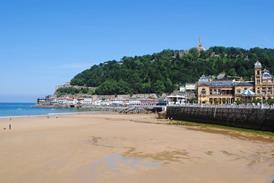Dir: Claire Denis. Fr.2004. 130mins.
"Impenetrable" would be a generous way of describing French auteur ClaireDenis' latest feature; adjectives like "self-indulgent" and "dull" might occurto the less well-disposed critic.
Not that this film is devoidof moments of visual poetry and - at least in the early stages - plot tension.But its wilful obscurity, its stubborn refusal to explain what the hell isgoing on, and why the moody, rugged Michel Subor first kills a man (or doeshe') then gets a new heart (perhaps) then embarks on a voyage to the South Seas(unless, of course, it's all in his head), soon curdles this film's vision, andalienates its audience.
The Intruder will be a letdown for those who were turned ontoDenis by the reticent but focussed Beau Travail, and intrigued by herlast full-length feature, the tight, dramatic, witty Vendredi Soir(which was picked up by Wellspring Media in the US).
Distribution prospects onthis one look limited, to say the least, with only the most hardline of arthouselabels likely to take a chance on the film outside of France.
The Intruder opens in the snowy Jura, on the border betweenFrance and Switzerland, and appears at first to be gearing up to become anexistential thriller featuring Louis, a taciturn, tight-fisted old bloke with aheart condition (Michel Subor); his son Sidney (Gregoire Colin); Sidney's wifeAntoinette (Florence Loiret-Caille) a customs official who works with snifferdogs on the border; and "The Queen of the Northern Hemisphere" - a gap-toothed,fur-coated kennel-owner played by a leering Beatrice Dalle.
When Louis apparently knifesan intruder in the grounds of his house while taking a cigarette break from anamorous encounter with the local pharmacist, it looks like the threads maystart to come together. The slow (but ravishing) scene-setting, the dogs in thesnow, the sinister hunters, the laptop computer Louis finds in a hut withenigmatic Cyrillic phrases on the screen: it feels as if all this atmosphere,all this set-up, will gel into a coherent storyline.
But it doesn't. Instead,Denis simply leaves all these plot threads hanging, and moves Louis first toGeneva, where he withdraws money from a bank vault and appears to have a hearttransplant, then to the Korean port town of Pusan, where he buys a hugeocean-going tanker "for my son", then to Tahiti, where it turns out that Louislived years before, spawning a son who now refuses to recognise him.
No matter: an islandcommittee holds interviews to assign Louis a new son to whom he can leaveeverything (this shuffle of hopeless hopefuls constitutes the film's onlymoment of light relief) before his new heart goes the way of the old one.
There is a discourse aboutexile and tainted paradises running through the film: Murnau's silent SouthSeas classic Tabu, Robert Louis Stevenson's travel diary In The SouthSeas and the melancholy Tahiti of Paul Gauguin all lurk in the wings ofreference, and it is telling that almost the first image we are given of theSouth Sea islands is not that of a palm-fringed beach, but the inside of asupermarket which, customers aside, could just as easily be on the outskirts ofHull.
But this intellectualsuperstructure remains just that; a web of reference to dip into if we feel soinclined, rather than a dynamo of ideas that is used to power an interestingplot. With the help of Agnes Godard's thoughtful cinemascope photography and SAStaples' tensely atmospheric electronic score, the film builds up a certainpoetic and symbolic resonance. But its lack of narrative respect for the viewerand failure to draw demarcation lines between dream and reality feel like abetrayal. We have given Denis two hours of our lives, after all, and deserve abetter return than this.
Prod cos: Ognon Pictures, ARTE France
Int'l sales: PyramideInternational
Prod: Humbert Balsan, FrancoisSauvagnargues
Scr: Claire Denis, Jean PolFargeau
Cine: Agnes Godard
Prod des: Arnaud de Moleron
Ed: Nelly Quettier
Music: SA Staples
Main cast: Michel Subor, BeatriceDalle, Gregoire Colin, Florence Loiret-Caille
















![[L-R]: Amanda Villavieja, Laia Casanovas, Yasmina Praderas](https://d1nslcd7m2225b.cloudfront.net/Pictures/274x183/6/4/1/1471641_pxl_20251224_103354743_618426_crop.jpg)


No comments yet